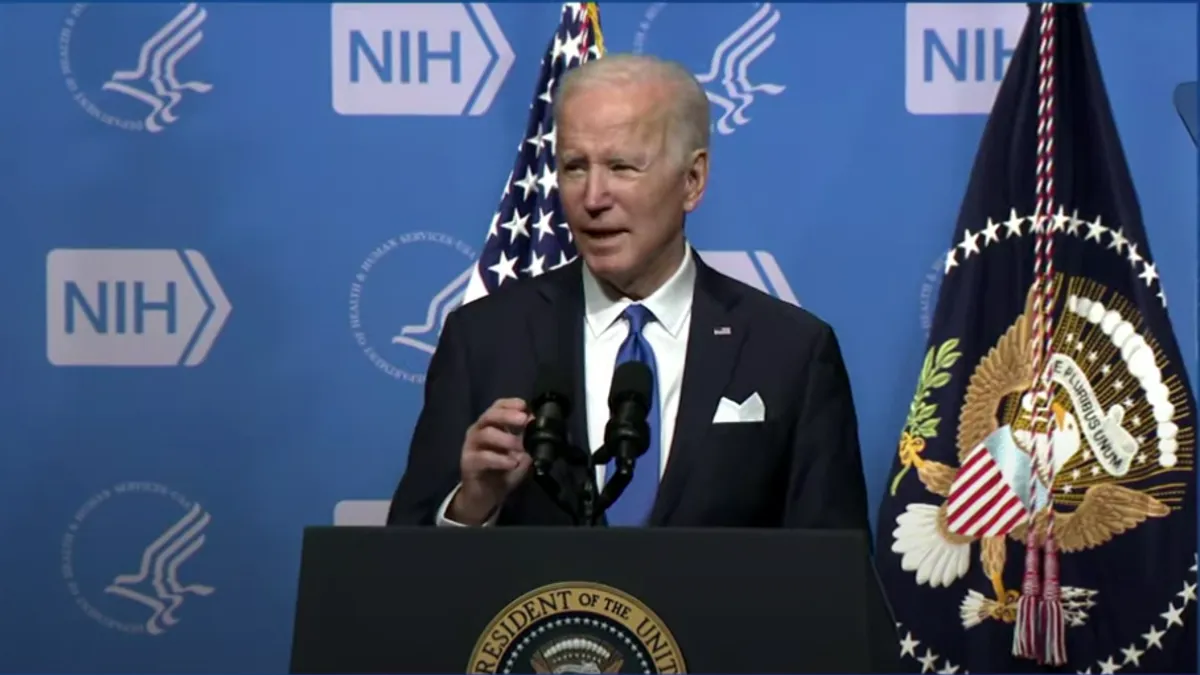Dive Brief:
- President Joe Biden said on Thursday that the federal government will purchase an additional 500 million rapid COVID-19 tests to distribute free to Americans to help meet the overwhelming demand for testing as the omicron variant continues to surge across the U.S.
- The procurement of the additional diagnostics now brings the administration's total purchase to 1 billion at-home test kits, following last month's announcement that the government will provide 500 million free rapid tests. Abbott Laboratories, iHealth Lab and Roche have so far been awarded contracts for a combined 380 million test kits. Biden said a website will be launched next week where Americans can order the free tests online and have them shipped to their homes but did not say when the tests will be available.
- Asked why the administration didn't buy the tests months ago, White House press secretary Jen Psaki said during Thursday's briefing that when Biden took office in January 2021, the FDA-authorized home testing options on the market were very limited and "now there are nine." While Psaki called the nation's demand for tests "unprecedented" despite the U.S. currently producing 300 million rapid tests per month, she pointed to a recent poll that showed "it's less than 10% of the American public that can’t find a test."
Dive Insight:
The Biden administration has come under fire from Democrats and Republicans for not doing enough to increase the availability of COVID-19 tests as omicron cases surged across the country. Some members of Congress contend the federal government was caught flat-footed when the highly transmissible variant spread quickly, straining U.S. testing capacity.
During a Tuesday hearing on the federal coronavirus response, Sen. Susan Collins (R-Maine), a member of the Senate Health, Education, Labor and Pensions Committee, said "it appears the administration simply failed to anticipate our testing needs," while ranking member Sen. Richard Burr (R-N.C.) called America's testing system broken.
Biden on Thursday said the federal government's procurement of the 500 million previously announced rapid tests "are in the process of being acquired" and that the total purchase of 1 billion at-home test kits is an effort "to meet future demand." When Biden laid out a plan last month to increase the availability of COVID-19 diagnostics, including distributing 500 million free test kits to Americans, Biden acknowledged that the administration needed "to do better" with home testing.
"The President has said we want to do more, and we are continuing to do more. And that's why we're running this expedited process to procure more tests to ensure they're free, they're accessible, and they're available to people across the country," Psaki said during Thursday's press briefing.
Psaki noted that the administration has so far procured about 380 million of the initial 500 million tests. "When we conclude this phase, we’ll move to the next 500 million," Psaki said, but could not provide a specific timeframe for the follow-on procurement and when the test kits might be made available for online ordering by the public.
The Department of Defense, in coordination with HHS, announced on Thursday that it awarded contracts for undisclosed amounts to Abbott Rapid Dx North America, iHealth Lab and Roche Diagnostics for the purchase of a combined total of 380 million over-the-counter COVID-19 test kits.
Abbott CEO Robert Ford told the J.P. Morgan healthcare conference on Tuesday that the company has "plenty of capacity" to support U.S. and international demand. Abbott's manufacturing capacity is more than 100 million tests per month globally and it is looking to expand that output.
"You're seeing also even more companies ramp up their manufacturing. The challenge here is just going to be how does this play out over time throughout the year," Ford said. "It was good to watch and see how testing has evolved over the last month, month and a half, and having that information is going to allow us to have a better sense of how we are going to guide for 2022."
Ford contends that "testing will eventually ramp down but there will be a portion that will be sustained." However, it's a constantly changing business environment that has been difficult for the company to forecast during the pandemic.
Abbott closed its rapid COVID-19 test manufacturing and assembly plant in Gurnee, Illinois, last June when demand for its BinaxNOW antigen tests dropped, only to reopen the facility just months later in September amid a surge in testing demand.
One potential way to avoid such shutdowns is through "warm-base" manufacturing funded in partnership with the government. In warm-base contracting, manufacturers are paid to not shut down their facilities and to maintain their capabilities through support that enables rapid scale-up of production when needed.
AdvaMedDx, the device lobby AdvaMed's division that represents diagnostics manufacturers, along with the American Clinical Laboratory Association sent a letter in September to the White House advocating for a number of policy recommendations to bolster testing capacity including "agreements with diagnostics manufacturers like vendor managed inventory and warm-base contracting."
While AdvaMed said in a written statement last month that the Biden administration's plan to purchase 500 million rapid COVID-19 tests and make them available for free was an "encouraging" step, the medtech lobby emphasized that the federal government plays a "pivotal role of guaranteeing the market," and going forward more must be done to ensure a consistent and reliable supply of diagnostics.













